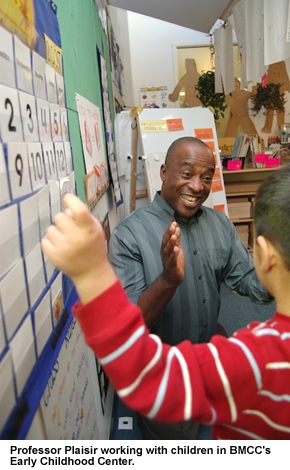
When Jean-Yves Plaisir joined BMCC’s department of teacher education two years ago, specializing in the early childhood field was the furthest thing from his mind.
“I’d taught in elementary school, but never at the early childhood level,” he says. But he couldn’t help noticing that his classes were comprised almost exclusively of women. “I found out that the scarcity of male early childhood teachers was a serious concern,” he says. Since then, Plaisir has campaigned tirelessly to attract more men to the field. It’s not an easy sell, he admits.
Dispelling misconceptions
“One of the biggest obstacles is the mistaken belief that women are instinctively better suited to teach and care for young children – and that this isn’t a suitable profession for men,” he says. “But it’s in their formative years that children most need positive male role models.” He cites studies that show that if young children have healthy, stable relationships with their fathers or other male figures, “they are more likely to develop leadership capabilities as adults.”
In addition to his teaching duties, Plaisir is responsible for mentoring and advising students in BMCC’s two early childhood programs – infant-toddler and pre-school. Both provide a core of liberal arts courses as well as specialized courses in child care and early childhood education. While many graduates become classroom teachers, others pursue careers in counseling, curriculum development, children’s television and other areas. “The possibilities are endless,” Plaisir says.
An emphasis on diversity
Plaisir’s classes focus heavily on bilingual education. “Many of our graduates go on to teach in the New York City public school system, which has one of the most culturally diverse pools of students in the country,” he says. “So it’s critically important to have teachers who speak the languages their students hear at home.” Is the push to bring more men into the profession an outgrowth of his commitment to diversity?
“In part, yes,” he says. “But there is more to it than that. “Early childhood education is the foundation of education itself. This is where children develop the social, motor, emotional and literacy skills that will set the patterns for the rest of their lives. What we’re aiming for is an educational setting where men and women work side by side, making a critical difference in the lives of the children they teach and care for.”

